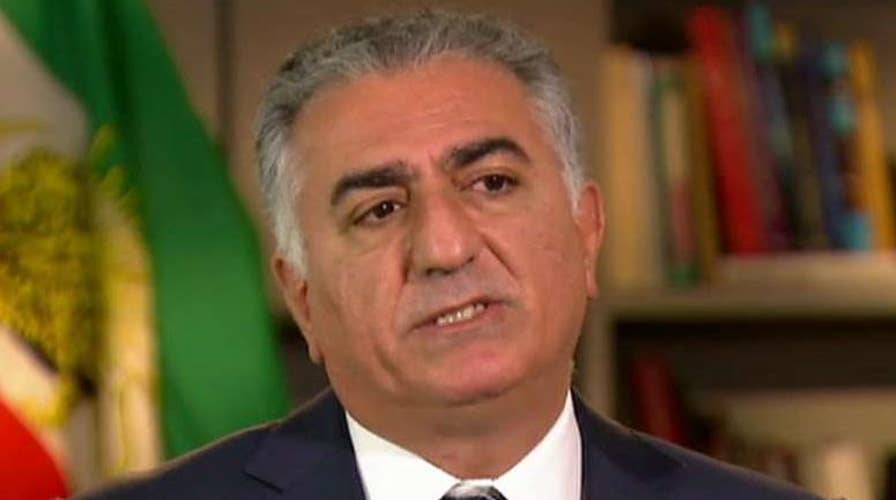Eric Shawn Exclusive: Freedom for Iran
Exiled Prince Reza Pahlavi calls for civil disobedience and protests
"The regime has been given enough chance to come clean. It hasn't, for good reason. Therefore, I say forget about the regime, think about the people."
He is the oldest son of the Shah of Iran, Mohammad Reza Pahlavi. Now Crown Prince Reza Pahlavi says he is fighting for the soul of his nation.
During his father's time, Tehran was a reliable ally and America was not the Great Satan as the U.S. has been so often called in Iran today. That ended when Pahlavi's family was overthrown by the 1979 Islamic Revolution of Grand Ayatollah Khomeini.
Iran's long-exiled prince wants a revolution in age of Trump
Now Pahlavi wants the Iranian people to rise up against the regime and establish a Parliamentary democracy based on democratic values, freedom and human rights.
"What I am calling upon is a process of civil disobedience, which is a method of change. How? By bringing domestic pressure on the system. If enough people refused to cooperate, like Indians in India during British time, when they can paralyze the system by massive sustained labor strikes across the nation, that is not shooting bullets in the streets," he said.
He added that the “method of change can be by non-violence, civil disobedience provided that it is nurtured and cared for." He noted that such mass movements have upended power structures from the collapse of the Soviet Union after the fall of the Berlin Wall, to the end of apartheid in South Africa. Pahlavi said there is no reason that a wave of popular support cannot topple the theocratic regime in Tehran, in a similar manner.
"History is full of such examples," Pahlavi notes.
"If change during the cold war was not ultimately, how do we defeat the Soviet system? How do we assist the dissidents? How do we empower or encourage the people who are trapped behind the Iron Curtain? None of these people would ever be heartened enough to ultimately roll of their sleeves and say: ‘Hey you know what? We are not abandoned anymore.’ From Sakharov to Solzhenitsyn all the way to the others, they said ‘hey, you know what? The world is not going to put up with it.’"
Reza Pahlavi on Growing Showdown With Iran
"Nelson Mandela was rotting in his cell in South Africa while half the world was doing business with the apartheid regime, until a point that the people in the world said, Basta!, enough, it is no longer acceptable."
Pahlavi said just like opposing past repressive regimes, Americans can take the lead in pressuring Tehran. He sent a letter to then President-elect Trump, hoping that his “administration will bear in mind the aspiration of the Iranian people and engage the secular democratic forces, providing support for the struggle of my fellow compatriots for peace, freedom, and democracy.”
"The more they hear about what the Iranian people demand, not what the regime wants, but what the Iranian people demand, they will in turn tell their congressmen, senators, and decision makers, ‘What are you waiting for? These people are like us! They don't want to come here and destroy us, or blow us to pieces or wipe a country from the map, they want to be like us!’"
Pahlavi also said that more should have been done to encourage the resistance during the so-called “Green Revolution” in 2009, when Iranians massed the streets demanding a free and fair election.
"If the people on the streets are holding up slogans, in English or in French, they are not practicing their linguistic skills, they are sending you a clear message. They were chanting on the streets, ‘Obama Obama’... in Farsi, (which) means either you are with them or you are with us. Make a choice. I think the choice was not to heed the call of the people."
Pahlavi said that he always has hope for a change in his country, because "it is in the nature of human beings."
He said people everywhere yearn for the same thing.
"It is three obvious factors. One is freedom and the ability to speak your mind and believe in what you want. The other one is an opportunity to participate in whatever system that is governing your country and the last but certainly not the least, dignity, human dignity, and when they deprive you as a human being for any of these, will you give up and not stand up and fight, and say if I have to sacrifice myself I am doing it so my children will not have to see this, that is the history of our world. From the days of Moses to today, it was always to be freed from bondage...and Iranians are not expectations to that."
Some fault the Shah's rule, and U.S. policy at the time, for setting the stage that enabled to Islamic revolution to succeed. But Pahlavi said that today, "there is no question" that the regime will eventually fall.”
"People are not giving up, they know it's tough, they know it's a high price," he said. "Change will occur. Whether we like it or not, it is a historical conclusion that this type of regime simply cannot survive, it's is just a matter of time. The only question is when, and at what cost."
Follow Eric Shawn on Twitter: EricShawnTV
Ben Evansky contributed to this report.

